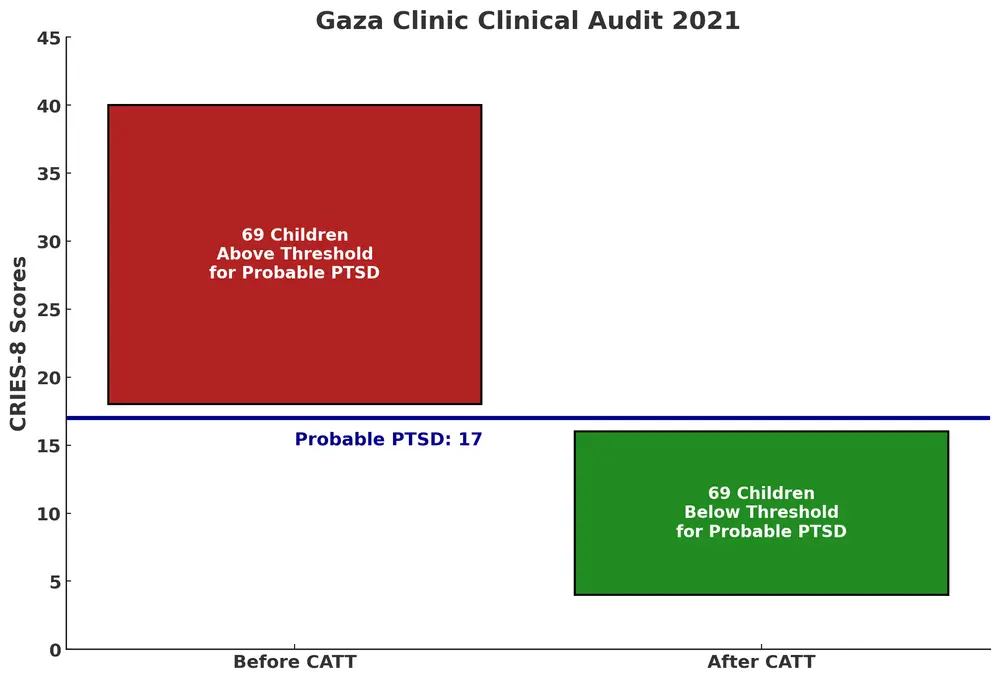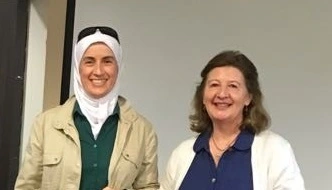Summary
Analysis of data from a study assessing the effectiveness of CATT with 69 children treated at a Children's Trauma Clinic in Gaza in 2019-20, showed that CATT significantly reduced trauma symptom severity in children and young people experiencing cumulative and ongoing stressors from conflict, violence and associated socio-economic instability, including those with chronic symptoms. Limited data from a small follow-up group indicated that CATT may increase children and young people's psychological resilience and mitigate the impact of further traumas.

Introduction
In July 2019, a Children's Trauma Clinic was set up in Gaza, funded by 3 NGOs (ACT International, Firefly International, and IMET 2000). Pre- and post- treatment data on all children seen during the first 18 months of the clinic's operation were collected and analysed to assess the effectiveness of CATT in this setting where children are exposed to ongoing, cumulative stressors due to the blockade and continued intermittent conflict, violence and associated economic and social hardships. 69 children and young people completed CATT treatment for PTSD between July 2019 and December 2020. This included 26 females (age -range 7-17 years, mean age 11.92 years), and 43 males (age-range 6-17 years, mean age 13.02 years). 28 Children and young people referred to the centre who on assessment were found not to have PTSD were referred to other services.
Analysis
The Arabic version of the Children's Revised Impact of Events Scale-8 (CRIES-8), a widely used measure of PTSD in children, was used as the pre- and post- treatment measure. At initial assessment, all 69 children received total scores on CRIES- 8 of over 17, the cut off for a likely clinical diagnosis of PTSD. (Range: 18-40/40) At post-treatment review, the score for every child had fallen to below 17 (range: 4-16/40). Mean reduction in CRIES -8 scores from pre to post intervention assessment was 19.01 (SD= 5.1). The Post-Catt assessment scores (M=10.26, SD= 2.53) were significantly lower than the Pre-CATT scores (M= 29.48, SD= 5.10), indicating that CATT significantly reduced symptoms of traumatic stress, measured using CRIES-8, to below the 17 point cut-off for probable PTSD.
The analysis shows that CATT was an effective treatment for symptoms of trauma in children and young people, including several who had lived with the effects of PTSD for 4 or more years, and despite continued exposure to potentially traumatising events. Parents and children also reported progress in life skills and psychosocial adjustment after CATT. A small group of children were seen for a follow-up review six- to-seven months after finishing CATT. The gains reported after finishing CATT treatment, and low CRIES-8 scores, were maintained in 9 of the 10 children, and further positive gains were reported. This indicated that CATT may help children and young people to develop their psychological resilience to cope with further traumatic events.
No child in the group of 69 showed an adverse mental health event (eg marked mood swings, or high levels of anxiety) during the treatment period, indicating that CATT is a safe treatment in this environment.
Further information from the follow-up group showed that in common with other young people whose lives have been disrupted by traumatic events, many of the children seen at the clinic -and their families/carers - required further psychosocial support for issues including mood disorders, adjusting to injury or disability and loss, and educational support, following or in addition to treatment for their PTSD.
Conclusion
This study showed that CATT is an effective and appropriate treatment for children in Gaza. The follow-up reviews identified several children in need of further psycho-social support: all children seen at the clinic will therefore be seen for follow-up reviews.
With many thanks to clinicians Mohammed El Sharif and Haithem Shamiyah, Clinical Supervisor Dr Ghalia El Asha, and Gaza Clinic Manager Tamara Curtis for brilliant support for the children, data collection and management, under difficult circumstances, and to ACTI Volunteer Assistant Psychologist Lily Holland for statistical analysis.
Victoria Burch, Clinical Trustee, ACT International, June 2021

